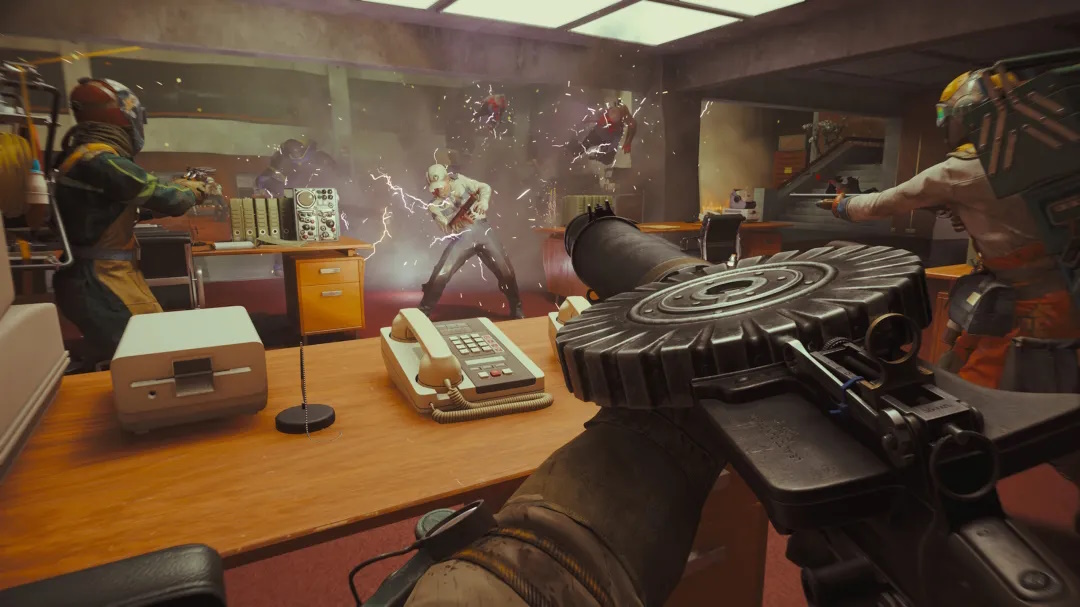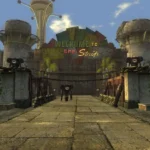The initial moments of Remedy Entertainment’s FBC: Firebreak, a new multiplayer spinoff set in the unsettling universe of 2019’s Control, offered a unique blend of humor and existential dread.
The first time I met my demise, hilariously, at the hands of an overwhelming horde of sentient sticky notes, I genuinely laughed. This slow, paper-inflicted death felt like a perfectly satirical demise in a game that heavily leans into the absurdity of corporate life. It was a novel concept, injecting humor into the mundane.
However, the charm quickly faded. The fourth sticky note-induced death elicited only a small grin, swiftly followed by a growing sense of annoyance. The relentless Post-Its gradually obscured my vision, consuming my virtual soul just seconds before I could reach safety. By the tenth such encounter, the novelty had completely worn off. Avoiding “note death” became just another tedious task, a routine chore to be completed before moving on to other equally repetitive objectives.
The meager rewards for these efforts felt insignificant, barely inching me closer to unlocking a new perk or a minor upgrade. This repetitive cycle, with its slow, unsatisfying progression, encapsulates the core issue of FBC: Firebreak. It is a collection of strong, inventive, and initially enjoyable ideas that ultimately strains and breaks when stretched over a live-service framework. The promise of engaging gameplay devolves into a monotonous grind, making the game feel less like entertainment and more like a second job.
The Bureau’s New Cleaners: Concept vs. Execution
Firebreak attempts to extend the Control universe by focusing on the mundane yet dangerous life of a Bureau cleaner, but its execution falls short of its potential.
A Nameless Struggle in The Oldest House
In Firebreak, players assume the roles of nameless cleaners. These individuals are dispatched by supervisors within The Oldest House, the iconic, ever-shifting building from Control. Their mission: to delve into the building’s supernatural depths and confront the Hiss. The Hiss are the primary antagonists from Control, an otherworldly, resonant force that corrupts reality.
Cleaners are also tasked with resolving other anomalies and problems within the FBC (Federal Bureau of Control). The distinctive mid-century architecture of Control is faithfully present, serving as the backdrop for these new assignments. Firebreak significantly amplifies Control’s satirical jabs at corporate drudgeries and petty managers, turning this critique into its entire foundational ethos.
However, beyond this thematic continuation and shared aesthetic, very little else makes Firebreak truly recognizable as a Control game. Crucially, the game makes no effort to tell a new story, or any story at all, for that matter. Unlike its single-player predecessor, which was lauded for its rich narrative and deep lore, Firebreak’s focus is almost entirely on the “job” itself.
This lack of narrative depth means players have little emotional investment or overarching purpose beyond the immediate task. The initial charm of the corporate satire quickly dissipates without a compelling story to anchor the repetitive missions, leaving players with a sense of emptiness.
Missions: Repetitive Tasks and Quirky Cures
Each “job” in Firebreak sends players deep into The Oldest House with specific objectives. These tasks primarily revolve around dealing with hordes of Hiss and fixing a particular problem. The variety of these problems, while initially amusing, quickly becomes formulaic. Players might be tasked with blowing up pink, goopy masses that are smothering generators, or desperately trying to destroy piles of sentient sticky notes before they literally “consume your soul” (a humorous but ultimately frustrating gameplay mechanic).
Other tasks involve harvesting irradiated pearls from giant leeches, adding a touch of the bizarre to the mundane.
Adding to the game’s quirky charm, shower stalls serve as universal cures for every status ailment. Whether you’re covered in sticky notes, on fire, or suffering from radiation exposure, stepping into a shower instantly washes away the negative effects. Throughout these missions, the cleaners themselves provide some of the game’s best moments, quipping humorously about their “desk jobs” and the Bureau’s famously “sketchy history.”
This blend of mundane corporate dialogue with supernatural threats is “ridiculous in the best ways” and can be “quite fun if you’re playing in a group — at least, initially.” The cooperative aspect enhances the humor, but this initial enjoyment is fleeting, as the core gameplay loop quickly reveals its shallow nature.
The Grind: A Live-Service Misstep
Firebreak struggles significantly as a live-service title, failing to implement the fundamental elements that keep players engaged over time.
Stagnant Progression and Lack of Evolution
A truly successful live-service game understands the importance of keeping players interested over an extended period. This is typically achieved through various mechanisms: by doling out meaningful upgrades at a fixed, satisfying pace, by gradually unlocking new modes or objectives, or by implementing “something” that consistently creates a sense of progression and encourages players to return. Firebreak, unfortunately, seems to miss these crucial elements.
The game essentially tells you everything about itself upfront and then remains unchanging. This static concept, which might work perfectly well in a linear single-player experience, becomes a critical flaw in a format that explicitly demands evolution, variety, and ongoing engagement.
It feels as though Remedy, perhaps inadvertently, relied on the worst tendencies of live-service games. These tendencies include an overreliance on “grinding” (repetitive tasks for minimal rewards) and the flawed “expectation that because you can unlock something, you’ll want to.” Instead of crafting unique and evolving ways to approach its core gameplay formula, Firebreak defaults to a repetitive loop that quickly becomes tiresome. The developers seem to have underestimated the need for dynamic content and a compelling long-term reward structure, leading to a sense of stagnation.
Inessential Job Kits: Missed Opportunities
Player characters in Firebreak begin with one of three distinct “job kits,” each with a specific tool: a giant wrench for melee combat, a splash machine that generates large water bubbles, or a jump tool that emits electrical charges. In theory, each kit is designed to make one part of a mission easier, such as bypassing a task like charging a generator or repairing a broken machine.
They also purportedly have secondary functions. For instance, the repair kit’s wrench is meant to double as a melee weapon, though I personally “didn’t notice any extra damage or staggering” when hitting a Hiss with it compared to a standard melee attack. The splash kit is intended to remove negative effects and apply the “wet” status, while the jump kit electrifies enemies, creating stun opportunities.
However, the utility of these kits quickly diminishes. While handling a task without the “right” tool takes longer—often involving a tedious quick-time event that demands dozens of button presses, seemingly designed solely to “create artificial tension”—the manual alternative is often not significantly more challenging. For example, you can recharge a battery instantly with the jump kit, but doing it manually only takes about 10 seconds, putting you at risk of being “overwhelmed by Hiss swarms.”
This minor inconvenience isn’t enough to make the kits feel truly essential. They seem like a compromise, perhaps reflecting Remedy’s reluctance to create rigid character roles common in multiplayer shooters while still needing some form of “structure to encourage cooperation between players.” Ultimately, like most aspects of Firebreak, the novelty of each kit wears out after clearing just a few jobs, failing to provide lasting strategic depth or variety.
Repetitive Missions and Limited Enemy Variety
The fundamental design of Firebreak’s missions and enemy encounters contributes heavily to the game’s pervasive sense of monotony.
Static Job Design and Lack of Incentive
Firebreak launched with a modest five distinct “jobs.” Each job offers several difficulty levels and additional locations within The Oldest House to clear. However, the actual jobs themselves remain fundamentally the same. For instance, the third stage of “Hot Fix,” one of the initial jobs, is essentially identical to its first stage, with the only variation being that players must repair furnace fans in three large areas instead of just one or two. This lack of meaningful variation means that players are repeatedly performing the same core tasks.
Crucially, there is little incentive to keep replaying these identical missions, despite the fact that “clearing the same mission over and over is the only way to earn loadout improvements.” This creates a frustrating loop where necessary progression is locked behind highly repetitive and uninspired content.
Limited Enemy Pool and Strategic Shallowing
Enemy variety was never Control’s strongest point, and Firebreak unfortunately inherits and even exacerbates this weakness, offering even fewer types of Hiss to plan around. The vast majority of enemies encountered—roughly 80% of those that spawn during a job—are the standard, “zombie-like” Hiss. Beyond these basic foes, players occasionally encounter “security guard-style enemies who use guns” and a slightly “sturdier foe equipped with explosives.”
A small squad of airborne Hiss will also “occasionally spawn, though these are rare.” The more “powerful” enemies that players must defeat to summon the service elevator to safety are simply drawn from this limited pool. They “behave the same as their standard counterparts, but with more health,” providing little tactical challenge until players venture into higher “clearance levels,” where they might finally encounter a handful of “more bizarre creatures, like a humanoid monster comprised of sticky notes.”
In contrast, games like Left 4 Dead maintain engagement through a subtle layer of strategy, where enemy types and map layouts force players to consider the best approach for a given situation. This might involve a stealthy approach to bypass a large enemy group, using precision weapons to eliminate the strongest threats before a team push, or a full-frontal assault with grenade launchers. While not “deep,” these variables ensure that player choices influence mission outcomes, keeping replays fresh.
This crucial decision-making element is simply absent in Firebreak. Even as players venture deeper into The Oldest House, the maps rarely lend themselves to truly “dangerous or strategic situations.” It’s largely “more of the same, with maybe an extra environmental hazard or two.” Fires, for instance, make Hiss stronger, but “extinguishing blazes takes so long that you’re better off eliminating the Hiss and ignoring the flames entirely”—an ironic situation given the game’s title, Firebreak.
The only significant difference weapon choice makes is “how quickly you reload,” at least until “you start unlocking a handful of improvements.” However, reaching this point takes “several hours,” and getting there feels like a “thankless chore, the kind of job you clock in for only because you have to.”
Frustrating Progression: Cosmetics Over Core Upgrades
Firebreak’s reward and upgrade systems embody the worst aspects of live-service design, prioritizing superficial unlocks over meaningful gameplay enhancements.
Quirkiness vs. Tedium: The Perk Problem
The perks and upgrades available in Firebreak are a perplexing mix of Remedy’s signature quirkiness and the most frustrating tendencies of the live-service genre. Some perks are genuinely great, injecting a dose of humor and utility. For example, the perk that makes you run faster when you’re on fire is not only amusing but also surprisingly useful for quickly escaping dangerous situations.
However, the majority of upgrades are typical of any generic shooter or action game, such as perks for conserving stamina while sprinting or strengthening shields to withstand more damage. While “fine and useful,” they are “nothing to get excited over.” The prevalence of these standard, uninspired upgrades, combined with the “comparative sparseness of improvements that have more of Remedy’s style or even Firebreak’s irreverent attitude,” is a significant disappointment. This dilutes the game’s unique identity.
However, even more disappointing is the method by which players acquire these perks and upgrades. All perks require “points” that players earn by completing missions. Players can also accumulate “extra points for collecting research files” scattered throughout the levels. Even a successful mission where the team collects plenty of research files will typically only reward around “10 points or so.”
This meager yield means these points “won’t get you far as you start trying to unlock higher-tier upgrades,” which demand significantly more. Furthermore, players also need to increase their “player rank,” a process that “takes even longer” and contributes to the agonizingly slow progression.
Forced Unlocks and The Grind for Grind’s Sake
Acquiring new weapons and other loadout upgrades, including better grenades, is part of another annoyingly tedious process. Firebreak organizes these in a separate menu. However, players cannot access most of these desirable unlocks until they clear an entire page of upgrades that precedes them. This required unlock “costs dozens of points”—the same points also needed for new perks—which effectively forces players to spend them on voice lines, sprays, new cosmetics, and other superficial items they might not even want.
This design choice is particularly egregious. It feels like a “grind for the sake of it,” compelling players to invest valuable, hard-earned progression currency into non-gameplay-affecting items solely to unlock the actual upgrades that could enhance their experience. This artificial gating of meaningful content exacerbates the feeling of tediousness and disrespects the player’s time.
Conclusion: A Shallow Experience in a Promising World
FBC: Firebreak possesses a compelling start point with its satirical tone and the intriguing world of Control. It even boasts “some decently fun combat improvements at the end point” for those patient enough to reach them. However, the crucial “route between the two is shallow and poorly realized.”
The core tasks within each job are “too simple and basic” to justify the extensive amount of time Firebreak expects players to spend replaying them. By the time players finally unlock those elusive “endgame combat improvements,” the overwhelming repetition and tedium of the journey have often rendered the prospect of continuing the grind unattractive. In essence, there is simply not enough substance to warrant Firebreak as a live-service game. It lacks the depth, variety, and engaging progression systems necessary to sustain long-term player interest.
Granted, as a live-service game, Firebreak has the potential for future improvements. “Progression issues, lack of variety and creativity in upgrades, and all the other annoyances can and possibly will get ironed out over time.” The addition of “more ways to play and actual incentive to keep replaying” would undoubtedly make a substantial difference, even if it might not fully compensate for the inherently “shallow, repetitive mission design.”
At launch, however, FBC: Firebreak feels remarkably like any mundane job task: it is “best approached in short bursts so you don’t burn out quickly.” Its current state offers a stark reminder that even a beloved franchise like Control needs more than just a thematic hook to succeed in the demanding live-service landscape. Without significant changes, it risks becoming just another forgotten entry in the ever-growing list of games that overpromise and underdeliver on long-term engagement.








